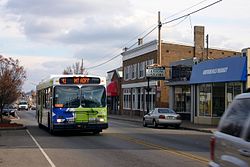Southwest Ohio Regional Transit Authority
 |
|

A Cincinnati Metro Route 41 bus heads West on Galbraith Road in North College Hill, Ohio in 2010
|
|
| Parent | Hamilton County and Cincinnati City Council |
|---|---|
| Founded | 1973 |
| Headquarters | 602 Main Street |
| Locale | Cincinnati, Ohio |
| Service type | bus service, paratransit, express bus service, streetcar |
| Routes |
|
| Stops | 4,465 |
| Stations | 17 streetcar station stops |
| Fleet | 353 transit buses, 5 streetcars, and 46 paratransit vehicles |
| Daily ridership | 48,000 unlinked passenger trips |
| Operator |
MV Transportation Transdev |
| Website | go-metro.com |
Southwest Ohio Regional Transit Authority, abbreviated SORTA, is the public transport agency serving Cincinnati and its Ohio suburbs. The agency provides Metro transit bus service, Access paratransit service, and the Cincinnati Bell Connector streetcar system in downtown Cincinnati. SORTA replaced the Cincinnati Transit Commission, which operated buses from 1952 to 1973. As of 2015[update], the agency operates 50 bus routes and facilitates approximately 16 million passenger trips annually.
SORTA is funded primarily by Cincinnati's city earnings tax, second by fares, and third by federal sources, with some other minor sources. This stands in contrast to other Ohio transit agencies, such as COTA and GCRTA which are primarily funded by sales tax. For a sense of perspective, the portion of Cincinnati's earnings tax going to Metro's budget is about 0.3%.
Downtown Cincinnati is also served by the Transit Authority of Northern Kentucky (TANK), whose transit services extend over the Ohio River into Northern Kentucky.
SORTA operates about 40 major fixed bus routes, as well as a demand-responsive paratransit service. Of the major routes, roughly half run only at rush hours and are essentially commuter services, some of them serving the reverse commute. The other half operate throughout the day, and some offer better frequency at the rush hours. Approximately 90% of all trips are made on the all-day routes, 10% on the express commuter routes. In 2012 SORTA released its schedule information in the General Transit Feed Specification, making schedules more easily available to customers.
...
Wikipedia
